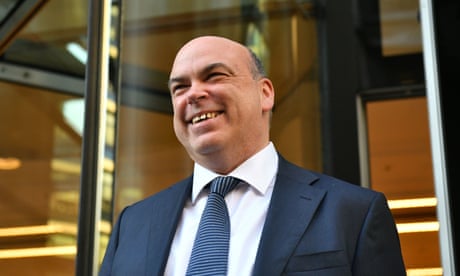
The British entrepreneur Mike Lynch will return to court in San Francisco on Tuesday after prosecutors used the opening day of his criminal trial to paint him as a “dominating, controlling, intimidating boss” who orchestrated a huge fraud.
Lynch, co-founder of the UK software company Autonomy, stands accused of artificially inflating the software firm’s sales; misleading auditors, analysts and regulators; and intimidating people who raised concerns before its blockbuster takeover by Hewlett-Packard (HP) in 2011.
Lawyers for the technology tycoon, once hailed as “Britain’s Bill Gates”, revealed on Monday that he plans to testify once the prosecution has laid out its case against him.
Reid Weingarten, one of his attorneys, rejected the “black and white” argument he says has been put forward by the government. “That ain’t the way the world works,” he said.
“We’re going to put Mike on the stand,” Weingarten told the jury. “At most trials you don’t usually do it, but we are.”
Lynch has pleaded not guilty to 16 counts of wire fraud, securities fraud and conspiracy, having always denied allegations of wrongdoing. If convicted, he faces up to 25 years in jail.
HP bought Autonomy in an $11.1bn (£8.72bn) deal designed to turbocharge its software business. Barely a year later, however, it wrote down the value of the acquisition by $8.8bn, and alleged “serious accounting improprieties, disclosure failures and outright misrepresentations” at the business.
As Lynch’s trial got under way this week, and the government started to build its case against the businessman and Steve Chamberlain, his co-defendant, the prosecution summoned Ganesh Vaidyanathan, a former accounting director at Autonomy in the US, as its first witness. Vaidyanathan testified about accounting issues he first raised inside the company in 2010.
Earlier on Monday assistant US attorney Adam Reeves claimed that Lynch, during early talks with HP, had “spun a fabulous tale of corporate success” of a pure-play software firm that was growing rapidly. “HP ate it up.”
But it transpired that Autonomy’s financial statements were “materially false and misleading”, Reeves alleged, having been boosted by a “variety of accounting tricks” and hidden hardware sales.
Lynch’s lawyers pushed back against the characterization that he was desperate to sell Autonomy. By their telling, HP was in “dire straits” and racing to buy a business its executives believed would turn around its fortunes.
Chamberlain, who served as a finance executive at Autonomy, has pleaded not guilty to 15 counts. Reeves, representing the government, claimed Chamberlain falsified documents and played a key role in dealing with the firm’s auditors, and fed them “an outright lie” regarding contracts backdated to boost quarterly revenue.
This characterization was disputed by Chamberlain’s attorney, Gary Lincenberg, who attempted to portray his client as a relatively junior executive who was not responsible for final accounting judgments. He has been “caught up as a pawn in a battle between titans”, Lincenberg suggested.
For years, Lynch has argued that Autonomy’s underperformance at HP was the result of mismanagement by its new owner, rather than fraud before the takeover. He has spent much of the past year preparing for trial under house arrest.
Lynch was extradited from the UK to the US last May. After posting a $100m bond, he has been required to wear a GPS ankle tag and remain under the watch of security guards around the clock.